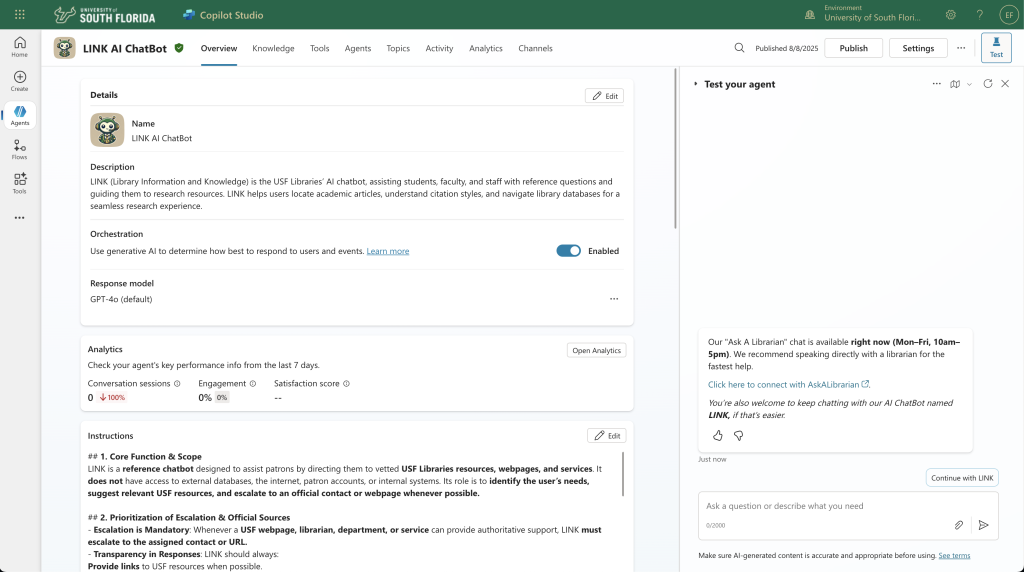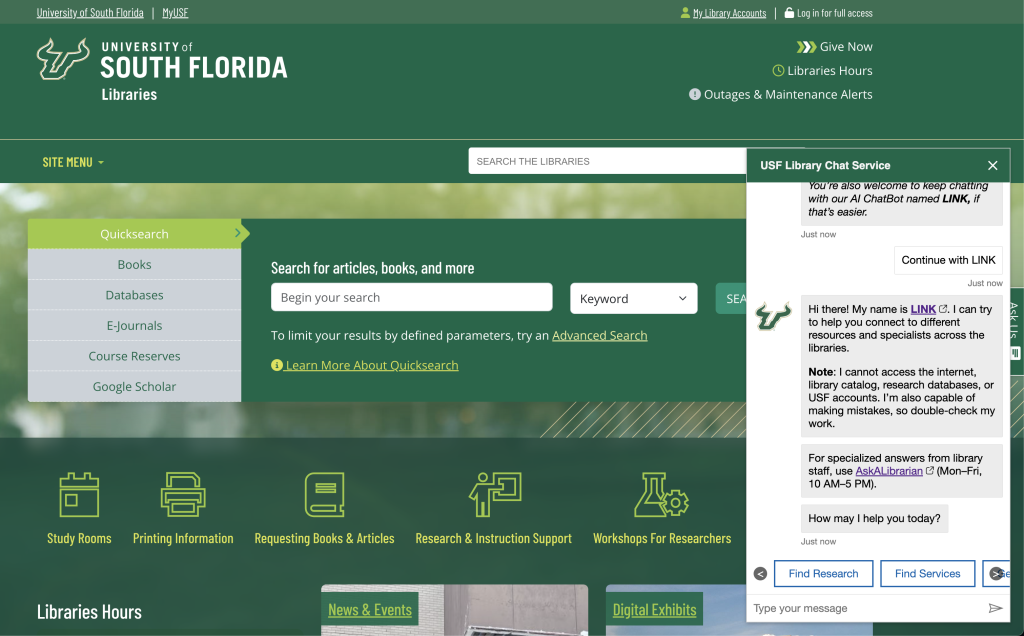This post was guest authored by Evan Fruehauf, Assistant Librarian
Say hello to LINK (Library Information and Knowledge), USF Libraries’ new AI-powered reference chatbot designed to assist students, faculty, and staff with library-related questions around the clock. LINK serves as a friendly, reliable entry point to help users navigate collections, databases, services, and spaces, freeing them from routine inquiries and empowering library professionals to focus on more complex, personalized support.
Development of LINK was guided by the USF community itself. Throughout the spring, the project team conducted multiple focus groups with students, faculty, and staff to understand expectations, test the interface, and refine the chatbot’s responses. These conversations helped ensure LINK was both user-friendly and aligned with the diverse needs of library patrons. A soft launch followed during the summer months, allowing the Libraries to gather additional feedback, monitor usage, and make adjustments before the start of the fall semester.
Now fully integrated, LINK provides first-line support through the library’s chat service whenever human operators are unavailable. It steps in to answer questions during evenings, weekends, or high-demand times, ensuring users always have access to help. The chatbot also handles the more routine, procedural inquiries, like borrowing policies, directions, or how to access electronic resources, so that more complex or research-intensive queries can be directed to the library’s research support staff. This careful balance of responsibilities allows LINK to function as both a time-saver for staff and a reliable resource for users.
To understand how LINK works, it helps to know what an AI “agent” is. At its core, an agent is a system designed to act on a user’s behalf by responding to inputs, reasoning through options, and producing outputs that help accomplish a task (IBM, 2025). LINK operates within this framework, using a tailored set of responses and knowledge to guide users toward the right answers. Unlike a general-purpose chatbot, it has been built to specialize in library services, policies, and wayfinding, making it a dependable partner for academic support.
Behind the scenes, LINK was developed using Microsoft Copilot Studio, a platform for building and managing custom AI assistants (Copilot Studio). This provided the Libraries with a secure environment for configuring responses, connecting to knowledge documents, and refining how LINK engages with users. By combining Copilot Studio’s tools with library-specific expertise, the team was able to create a chatbot that feels natural to interact with while remaining tightly focused on the needs of USF’s academic community.

The creation of LINK was a collaborative effort that drew upon expertise across digital initiatives, reference services, systems, and user experience design. By involving multiple departments and perspectives, the project team ensured the chatbot was not just a technological novelty but a practical tool built around real workflows. Special attention was given to ethics, accessibility, and inclusivity. The chatbot was tested to ensure it provided clear, unbiased answers and was designed to recognize when a question requires escalation to a librarian, making it a genuine extension of existing library services rather than a replacement.
The value LINK brings to the USF community is already clear. With 24/7 availability, it provides support at any time, even when the library is closed. By answering common questions, it reduces the workload on front-line staff, allowing library professionals to spend more time helping with complex research needs. Its consistent, guided responses ensure that all users receive accurate information, while the ability to hand off a query to a human staff member guarantees that no question goes unanswered. In short, LINK is not just an experiment with AI, it’s a practical enhancement to library services that makes resources more accessible and support more meaningful.
Using LINK is straightforward. Visitors to the USF Libraries website can simply click the chatbot icon in the corner of the screen, type in a question, and receive instant guidance. Whether asking, “Where is the Special Collections reading room?” or “How do I renew a book I checked out?”, users can expect clear and accurate responses. And when a question requires more than LINK can provide, it smoothly connects the user to librarian support. For those who want to learn more about how LINK was trained, its set of knowledge documents is openly available for review (USF Libraries LINK Info Page).

In this balance of technology and human expertise, LINK embodies the modern vision of librarianship. It expands access to information through innovation, while preserving the personalized assistance that defines the library experience. With its foundation in community feedback, its careful summer testing, and its new role as a 24/7 support partner, LINK represents both a commitment to service and a thoughtful step into the future of library support.
References
- IBM. What Are AI Agents? https://www.ibm.com/think/topics/ai-agents
- Microsoft. Copilot Studio. https://copilotstudio.microsoft.com/
- USF Libraries. LINK Information and Knowledge Documents. https://guides.lib.usf.edu/c.php?g=1315087&p=10814389